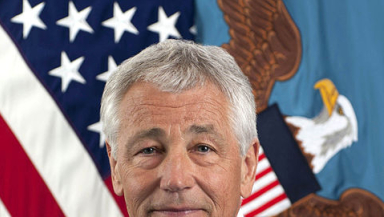
U.S. Defense Secretary Chuck Hagel stated Sunday that the military's ban against transgender individuals "continually should be reviewed."
In an on-camera interview, Hagel described why transgendered soldiers were not allowed after the 2010 repeal of "Don't Ask, Don't Tell," which allowed openly gay servicemembers.
"The issue of transgender is a bit more complicated because it has a medical component to it," he told Martha Raddatz of ABC News. "These issues require medical attention. Austere locations where we put our men and women, in many cases, don't always provide that kind of opportunity."
Some transsexuals undergo hormone therapy, sexual reassignment surgery, and other medical procedures to physically resemble the gender they identify with.
Despite potential medical challenges, Hagel said that he feels that transgendered persons should be allowed to serve in the military.
"Every qualified American who wants to serve our country should have the opportunity, if they fit the qualifications and can do it," he said.
"This is an area that we have not defined enough."
According to a San Francisco State University study, over 15,000 transgendered persons currently serve in the military and National Guard.
More questions over the military's handling of transgendered persons have arisen because of a transgendered military prisoner, Chelsea Manning.
Manning, a former Army private, was sentenced to 35 years in a military correctional facility for her involvement in the WikiLeaks scandal—a massive release of classified documents to the public—in 2013.
A biological male formerly known as Bradley, Manning has filed legal documents to be treated as a female while incarcerated, and to begin receiving hormone replacement therapy. The military does not provide such assistance to transgendered individuals.
Earlier this month, the Pentagon stated that the military's guidelines are not being reviewed.
"At this time there are no plans to change the department's policy," a spokesperson told Slate.













